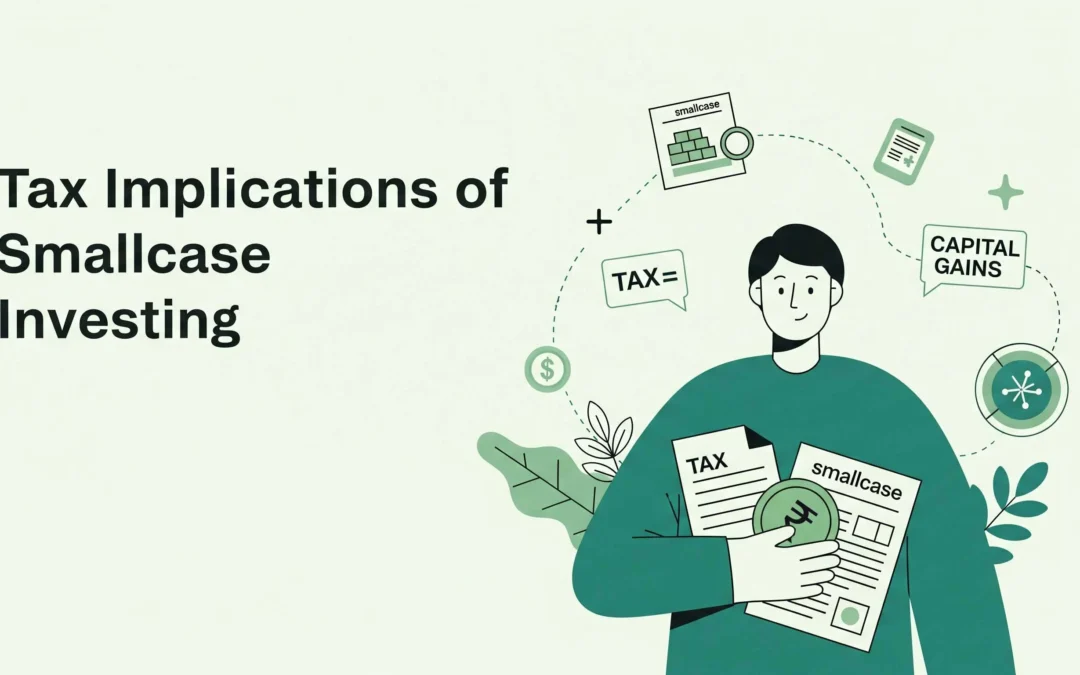Tax implications of smallcase investing in India are important for investors to know. Capital gains and dividend income are taxed based on various factors, like the period of holding and the amount that is subject to tax. TDS is charged in case of dividend income. There are certain exemptions available that can be used by the investor.
This article explores the tax rules in detail, and it will help you to fill out your returns related to smallcase investing. Read further to know better.
Understanding Smallcase and Taxation
Smallcase investments are real stocks held in your demat account. It is an investment driver that carefully selects stock or exchange-traded fund (ETF) portfolios based on themes or strategies such as dividend yield, value investing, electric mobility, or sectoral focus.
Features:
- Gains are regarded as either short-term or long-term capital gains.
- Your income slab determines how dividends are taxed.
- Every stock in the basket is subject to separate taxes.
The table below shows the features of smallcase in comparison with a mutual fund for your better understanding.
| Feature | Smallcase | Mutual Fund |
| Ownership | Direct stocks in demat | In the form of fund units |
| Capital Gains Tax | Stock-wise, based on holding | Based on NAV (unit-wise) |
| Control | Full control over timing | Limited control |
How Smallcase Investments Are Taxed in India?
There are two primary types of tax implications for smallcase investors:
- When you sell stocks from your Smallcase at a profit, you are subject to capital gains tax, either STCG or LTCG, depending on the period for which it is held.
- Dividend tax is applied to dividend income received from businesses.
Even though you can purchase or sell the stocks in the Smallcase as a single bundle, each one is treated separately for tax purposes.
| Income Type | Tax Category | Tax Rate |
| Profit on Sale | Capital Gains (STCG/LTCG) | 20% (STCG) / 12.5% (LTCG above ₹1.25L) |
| Dividend Income | Income from Other Sources | As per the income tax slab rate |
Capital Gains Tax on Smallcase Transactions
When securities in the Smallcase are sold for more than their original purchase price, capital gains are realised. Any sale, whether it’s a complete exit or a partial rebalancing, is handled like any other equity sale because you own the shares directly.
Capital Gain = Sale Price – Purchase Price – Brokerage and Other Charges
The holding period of each individual stock at the time of sale is what distinguishes the tax treatment.
| Holding Period | Type of Gain | Applicable Tax Rate |
| Less than 12 months | Short-Term Capital Gain | 20% + cess and surcharge |
| More than 12 months | Long-Term Capital Gain | 12.5% on gains exceeding ₹1.25 lakh + cess and surcharge |
Short-Term Capital Gains (STCG) Tax
Short-Term Capital Gains (STCG) occur when you sell stocks or exchange-traded funds (ETFs) in your Smallcase before the full 12-month holding period has passed. These gains are handled under Section 111A of the Income Tax Act in accordance with Indian tax laws.
Key Features:
- 20% is the applicable tax rate (plus applicable cess and surcharge) for listed equity shares and equity mutual funds, effective from July 23, 2024.
- Holding Duration is under a year
- Short-term capital losses (STCL) may be deducted from STCG.
- The investor gets the benefit of carry-forwarding the losses for 8 assessment years.
Long-Term Capital Gains (LTCG) Tax
When you sell stocks or exchange-traded funds (ETFs) in your Smallcase after holding them for more than a year, you are subject to Long-Term Capital Gains (LTCG). By providing favourable tax treatment, this encourages the development of long-term wealth.
Key Features:
- The tax rate is 12.5% on gains exceeding ₹1.25 lakh in a fiscal year.
- Exemption up to ₹1,25,000 in long-term capital gains is allowed.
- Indexation benefit does not apply to investments in stocks or exchange-traded funds
- Long-term capital losses (LTCL) can be offset by LTCG.
| Criteria | Tax Rate | Exemption Available | Holding Period | Indexation |
| Annual LTCG up to ₹1,25,000 | 0% | Yes | More than 12 months | No |
| LTCG beyond ₹1,25,000 | 10% | Tax only on the excess | More than 12 months | No |
Taxation on Dividends from Smallcase Stocks
Companies give their shareholders a portion of their earnings as dividends. Dividends from dividend-paying stocks purchased through Smallcases are deposited straight into the bank account associated with your demat account.
Features of Dividend Taxation:
- The taxation of dividends is based on the investor’s income tax slab rate.
- If a single company’s total dividend for a fiscal year exceeds ₹5,000, TDS at 10% is applicable.
- Dividends must be reported on the Income Tax Return (ITR) in Schedule OS.
| Dividend Amount per Company | TDS Applicable | Tax Rate | Tax Reporting |
| Up to ₹5,000/year | No | As per the income slab | Schedule OS (ITR) |
| Above ₹5,000/year | Yes (10%) | Income slab minus TDS credit | Schedule OS + Form 26AS |
| Applicable to Smallcases | Yes | Yes | Yes |
Bottomline
The conclusion can be drawn that it is important to understand the tax implications of smallcase. The criteria of taxing capital gains, both STCG and LTCG, vary based on the period of holding and the amount. In case of dividends earned, TDS is charged based on the amount. The tax reporting requires the individual to know about schedules and forms as well.
Understanding the exemption empowers investors to save tax. A better knowledge of tax implications can help in avoiding penalties and fines.


